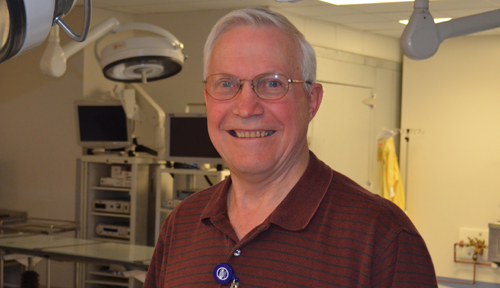Paul Becker prefers the word “donor.”
He meets the donors’ families — close to 225 a year. He’s the one who fields their questions, walks them through the process.
He serves as the face of the institutions that will receive their family members — what some people call cadavers — and use them to educate a new generation of health care professionals.
And when the donors’ “teaching time,” in Becker’s words, is complete, he contacts these families to arrange for the return of the urn of their loved one.
It is a responsibility, but it’s also the heart of his program, said Becker, who is the manager and only fulltime employee of the state of Nebraska’s Anatomical Board.
|
|
Becker has 30 years of experience as a licensed mortician, the last 11 of which he has spent working for the board, receiving donors and sending them out to medical schools across the state — including to UNMC, where he is based.
He does not consider his donors teaching tools. In fact, he considers them teachers.
“The donor is very much a teacher,” he said. “The donor provides a method of learning that is not possible any other way, and that’s the value of the donation.
“The medical professionals who are trained by that donor, one of them might be the one that discovers the cure for cancer, or diabetes, or another of the different diseases out there,” he said. “And it’s an exciting thought to be part of that, even if it may be far into the future.
“A relative of mine who’s been a radiologist for 30 years says he’s never had a day go by when he’s at work where he doesn’t remember something he learned from his donor,” Becker said.
Becker’s donors usually stay in the medical program for about 18 to 24 months, he said. At Creighton and UNMC, the donors leave the program with a memorial service, designed by the medical students as a way to thank the donors and their families for their help.
“It’s a chance for the medical students to understand that their donor was the loved one of a family, and it’s also a chance for the families of the donors to understand the importance of what their loved one did, and the good that it will do far into the future,” Becker said.
For information on becoming a donor, go to the Nebraska Anatomical Board’s website.

Thanks Paul for being the "heart" of the body donation program. We see daily how much the students, and faculty, benefit from this essential component of our educational mission.
How does one become a donor?
For information on becoming a donor, go to the Nebraska Anatomical Board's website. A link has been added to the story.
I have enrolled as an anatomical donor. I hope to live in my body to the point that organ, tissue and cornea donation will not be viable. For me, anatomical donation is an act of stewardship. My physical body will be put to good use after I'm done with it. As a practical person, I appreciate that my body will be properly cremated when teaching is finished. Thanks Paul for all that you have done to make the process of anatomical doonation happen.